September 9, 2025

Choosing the right virtual event platform is critical for engaging your audience and achieving your strategic goals. Whether you're hosting a multi-day international conference, a targeted webinar series for a professional association, or a hybrid trade show for corporate partners, the technology you select forms the foundation of the entire attendee experience. A misaligned platform can lead to technical glitches, low engagement, and a poor return on investment, while the right one can unlock new revenue streams and build a stronger community.
This guide provides a comprehensive breakdown of the best virtual event platforms available today. We move beyond surface-level marketing claims to offer an in-depth analysis of what each solution truly offers. Our goal is to equip event planners, community managers, and corporate organizers with the detailed insights needed to make a confident and informed decision. You will find practical, real-world evaluations that focus on the specific needs of professional associations, enterprise clients, and membership-based organizations.
Inside this resource, you'll discover:
We've structured this list to be scannable and straightforward, allowing you to quickly identify the platforms that best match your specific event requirements, from small-scale webinars to complex, multi-track virtual conferences with extensive networking and sponsorship needs. Let's find the perfect platform to elevate your next event.
GroupOS establishes itself as one of the best virtual event platforms by offering a powerful, all-in-one ecosystem that expertly merges event management with robust community-building features. Unlike platforms that focus solely on the live event window, GroupOS is engineered to manage the entire member lifecycle, transforming one-off virtual events into continuous, year-round engagement. Its core strength lies in its ability to centralize operations, allowing organizations to manage ticketing, content delivery, sponsorships, and member communications from a single, custom-branded hub. This integrated approach not only streamlines administrative tasks but also provides a seamless and cohesive experience for attendees and members.

This platform excels by integrating directly into the channels where your audience already exists. Through its native connections with platforms like Slack and Facebook Groups, GroupOS allows you to manage backend logistics while your members interact in familiar environments, significantly lowering the barrier to participation.
GroupOS supports new clients with a free trial and custom setup services, ensuring a smooth transition and rapid deployment. Its intuitive drag-and-drop page builders and member migration tools empower organizations to launch their branded community and event portals quickly.
Pricing: Pricing details are available upon direct inquiry, as the platform offers customized solutions tailored to specific organizational needs. This approach ensures you get a package that aligns with your scale and objectives.
Best for: Organizations seeking a unified solution to manage both large-scale virtual events and an active, engaged member community.
Learn more at GroupOS.
Leveraging the universal familiarity of its core meeting software, Zoom Events stands out as one of the best virtual event platforms by extending the classic webinar into a full-featured conference environment. It builds upon the standard Zoom Meetings and Webinars products, adding a dedicated event hub, multi-session and multi-track agenda management, and robust ticketing and registration capabilities.
This platform is ideal for organizations already embedded in the Zoom ecosystem. The user interface for both organizers and attendees is instantly recognizable, significantly reducing the learning curve often associated with adopting new event tech. For large-scale broadcasts, Zoom Events supports audiences of up to 1 million viewers, making it a go-to for major industry keynotes or global town halls.
Zoom Events offers a flexible approach to pricing, with options for an annual subscription or a pay-per-attendee model. This allows organizations to choose the most cost-effective path based on their event frequency and size.
To ensure your sessions are engaging, explore these virtual event best practices for tips on production and audience interaction.
Website: https://www.zoom.com/en/products/event-platform/
Following its acquisition of Hopin, RingCentral Events has emerged as a powerhouse among the best virtual event platforms, combining a mature, all-in-one event solution with the backing of a major unified communications provider. It delivers a comprehensive workflow for virtual and hybrid events, encompassing everything from initial registration and ticketing to post-event analytics, with a distinct focus on creating modern, interactive experiences for attendees, sponsors, and exhibitors.
The platform excels at fostering genuine connection through its robust networking features and a visually engaging virtual expo hall. Organizers benefit from a suite of AI-powered tools, including assisted content creation and Q&A moderation, which streamline management and enhance the attendee experience. With over 40 native integrations, RingCentral Events connects seamlessly with existing marketing and sales stacks.
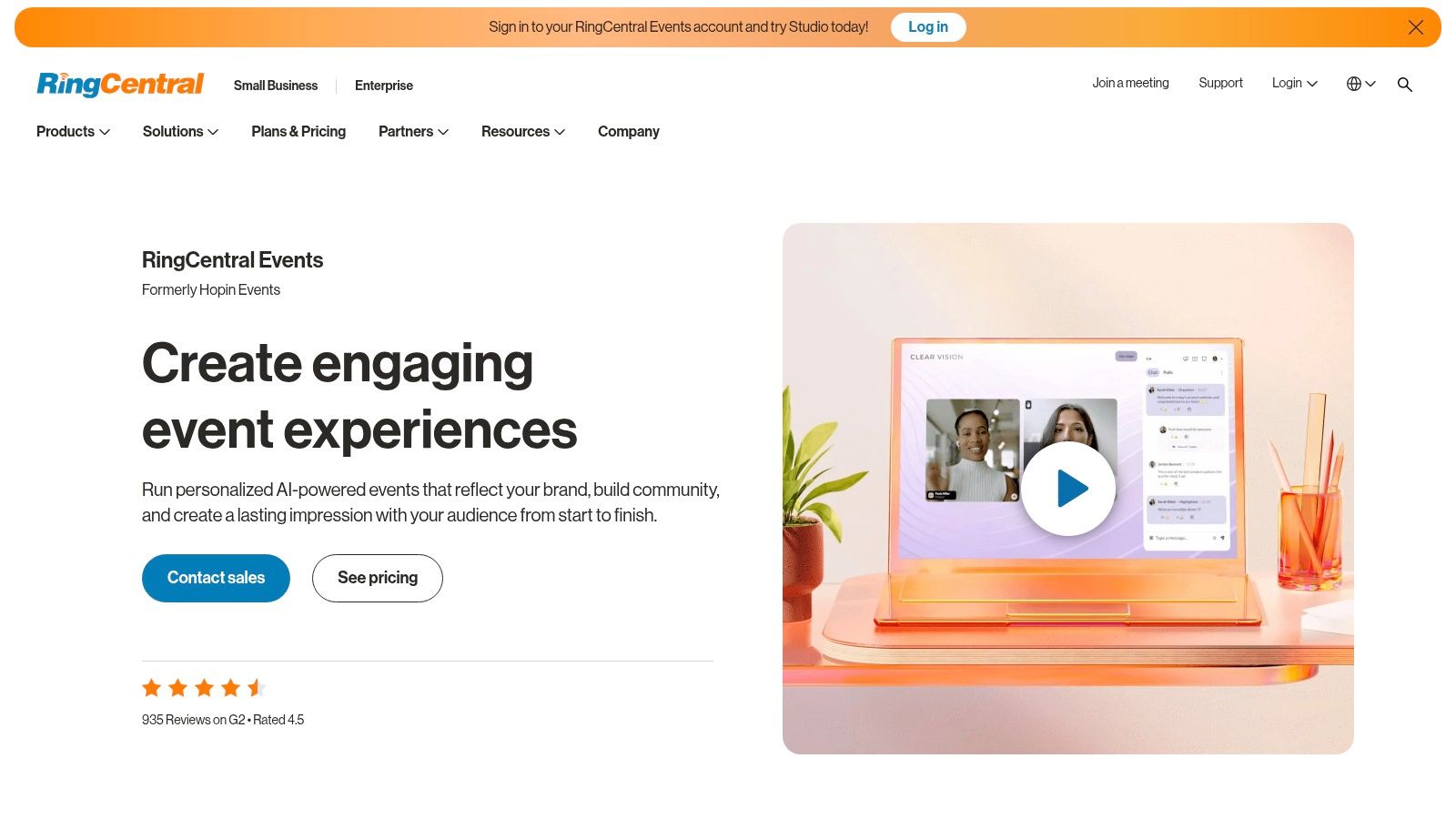
RingCentral Events offers both a try-free option for smaller events and a sales-assisted buying process for larger, more complex needs. This dual approach provides an accessible entry point while ensuring enterprise-level clients receive tailored support and packaging.
Website: https://www.ringcentral.com/rc-events.html
Acquired by Cisco and integrated into its collaboration suite, Webex Events (formerly Socio) is an enterprise-grade platform designed for end-to-end event program management. It provides a robust, secure, and scalable solution for virtual, in-person, and hybrid events, making it a strong contender among the best virtual event platforms for large organizations, especially those in highly regulated industries. The platform's strength lies in its comprehensive feature set that covers the entire event lifecycle.
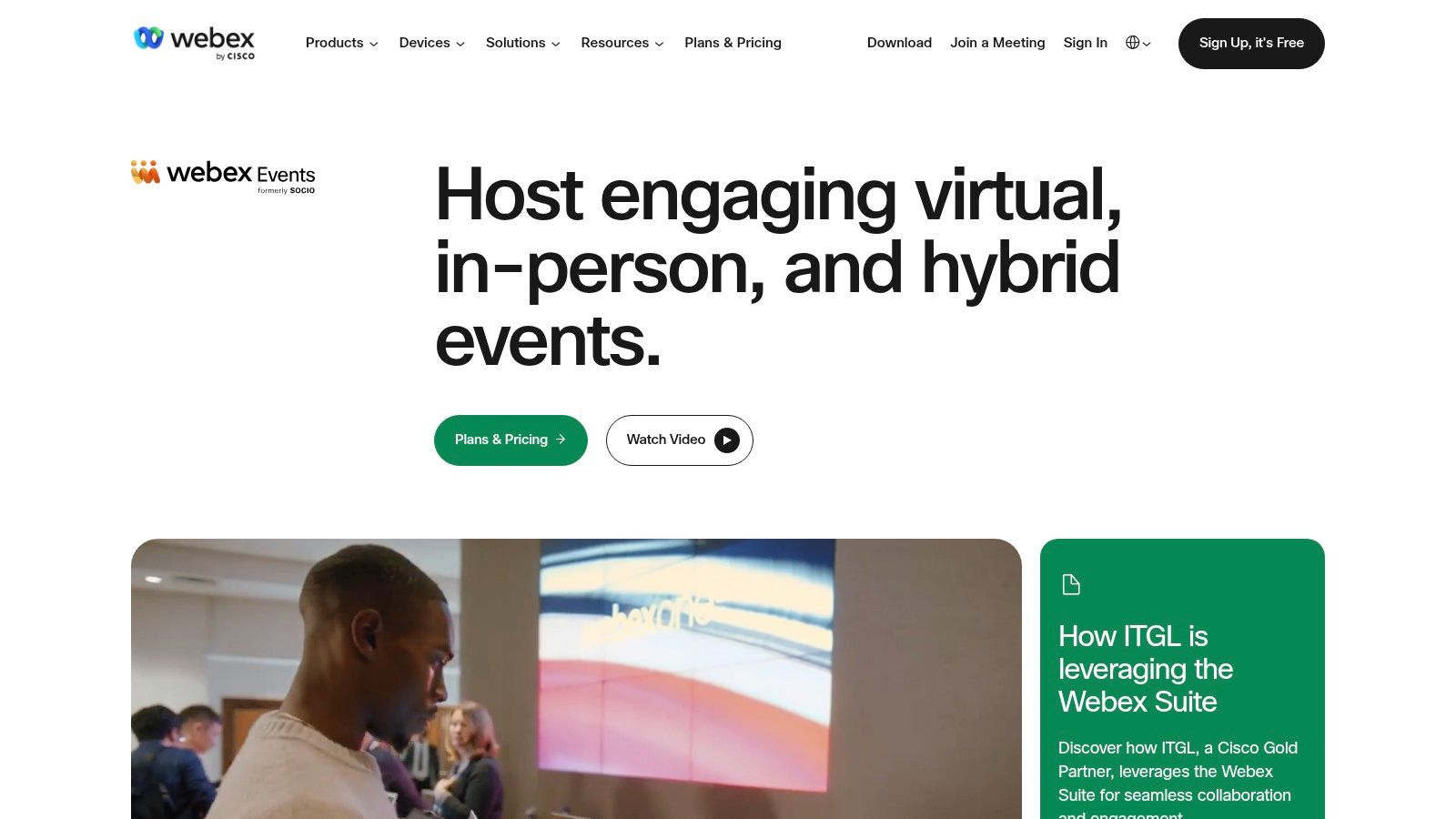
This solution is tailored for IT-led deployments within corporations already leveraging the Cisco ecosystem. It excels in managing a portfolio of events with powerful tools for registration, streaming via its native production studio or RTMP, a dedicated mobile app for attendees, and interactive features like networking and gamification. The emphasis on data, reporting, and security is a key differentiator.
Webex Events is not a standalone product; it is bundled within select Webex Suite Enterprise Agreements. This packaging model is ideal for large companies looking to consolidate their tech stack but can be a barrier for organizations not seeking a full suite license.
Website: https://www.webex.com/us/en/products/suite/events.html
ON24 establishes itself as one of the best virtual event platforms by focusing heavily on data-driven marketing and demand generation. It’s designed less as a standalone meeting tool and more as a complete digital experience engine, converting webinars and virtual events into rich sources of first-party engagement data. The platform excels at creating polished, TV-like broadcasts and interactive content hubs that guide prospects through the sales funnel.
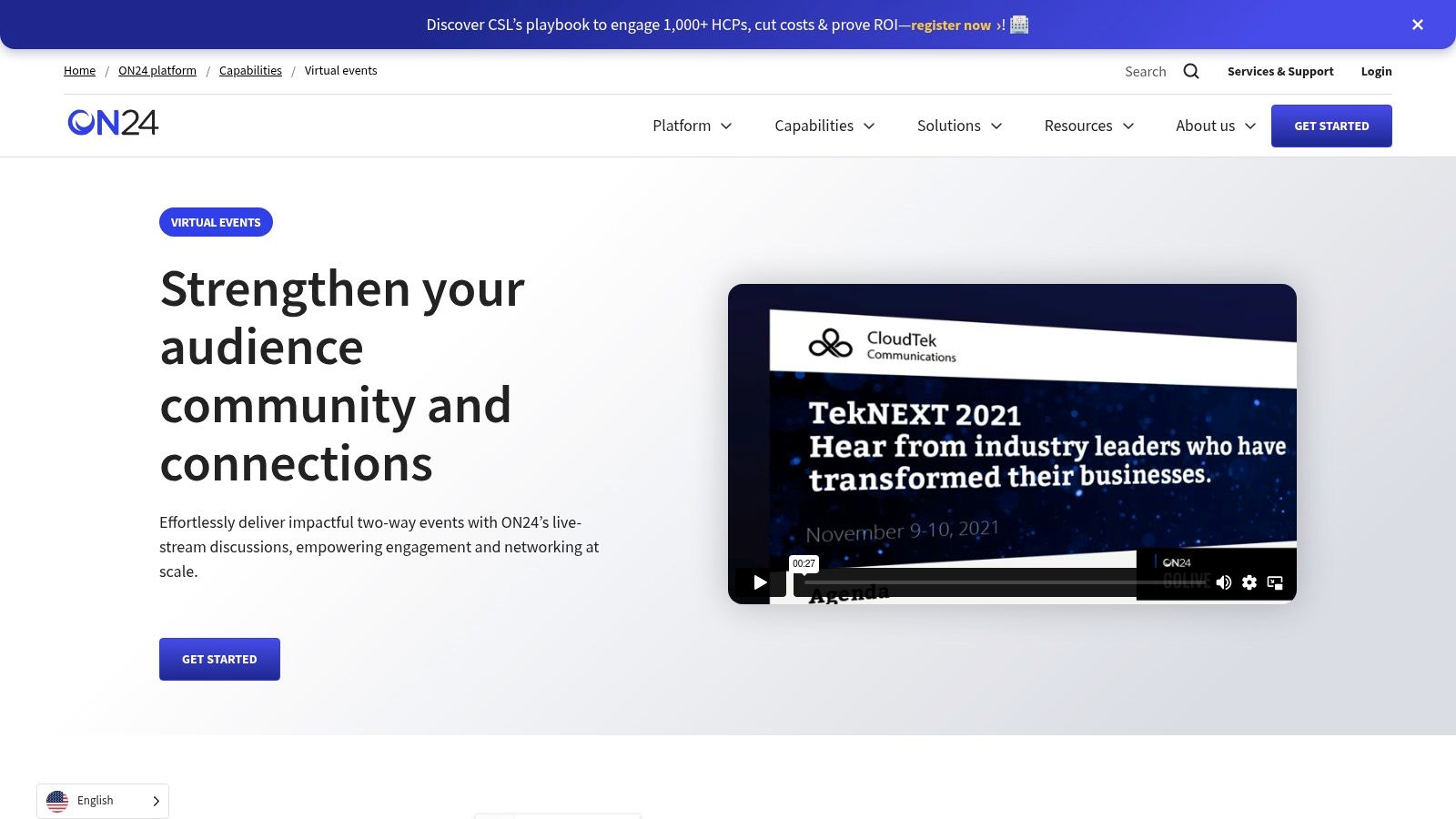
This platform is purpose-built for marketing and sales teams who measure success by lead quality, pipeline acceleration, and ROI. Its powerful analytics provide deep insights into audience behavior, tracking everything from content downloads to poll responses. This allows for precise lead scoring and seamless handoffs to sales teams through its extensive CRM and marketing automation integrations, making it a favorite for account-based marketing strategies.
ON24 is an enterprise-grade solution, and its pricing is provided via a custom quote from its sales team, reflecting its focus on larger organizations with sophisticated marketing needs. This model ensures the package is tailored specifically to a company's goals and scale.
After generating leads with ON24, it's crucial to maximize turnout for future sessions. Discover key strategies to increase event attendance and ensure your marketing efforts pay off.
Website: https://www.on24.com/platform/capabilities/virtual-events/
Airmeet has carved out a niche as one of the best virtual event platforms by focusing on deep attendee engagement and transparent, scalable pricing. It excels at transforming standard webinars into interactive experiences and provides a robust framework for hosting complex, multi-track conferences. The platform is designed to foster genuine connection through features like virtual networking tables, one-on-one speed networking, and dynamic Q&A sessions.
This versatility makes Airmeet a strong contender for mid-market teams and organizations that need a powerful yet intuitive solution for both virtual and hybrid events. The platform supports everything from simple webinars to large-scale conferences with integrated ticketing, sponsorship booths, and dedicated mobile apps, ensuring a seamless experience for organizers and attendees alike across different formats.
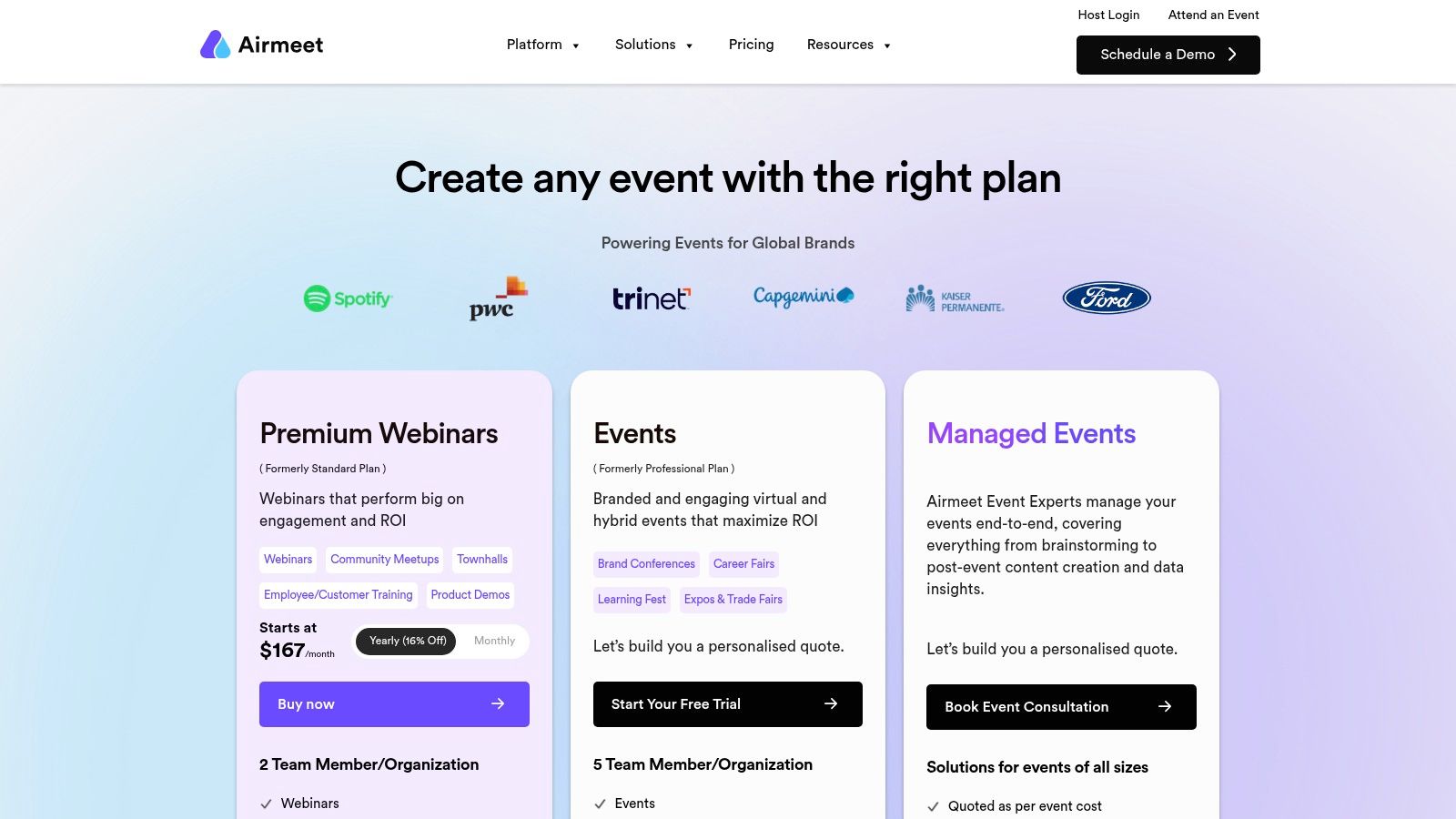
Airmeet offers a clear pricing structure, with premium webinar plans starting around $167 per month when billed annually, and scales from 100 to 10,000 attendees per event. This attendee-based model allows for a predictable cost structure, which is beneficial for budget planning.
Website: https://www.airmeet.com/hub/pricing/
vFairs has carved out a niche as one of the best virtual event platforms by offering a high-touch, full-service model that excels in creating immersive and custom-branded 3D virtual environments. This platform is particularly favored by large enterprises, universities, and organizations hosting career fairs or trade shows, where a visually engaging and intuitive attendee journey is paramount. They provide dedicated project management to guide clients through the entire event lifecycle.
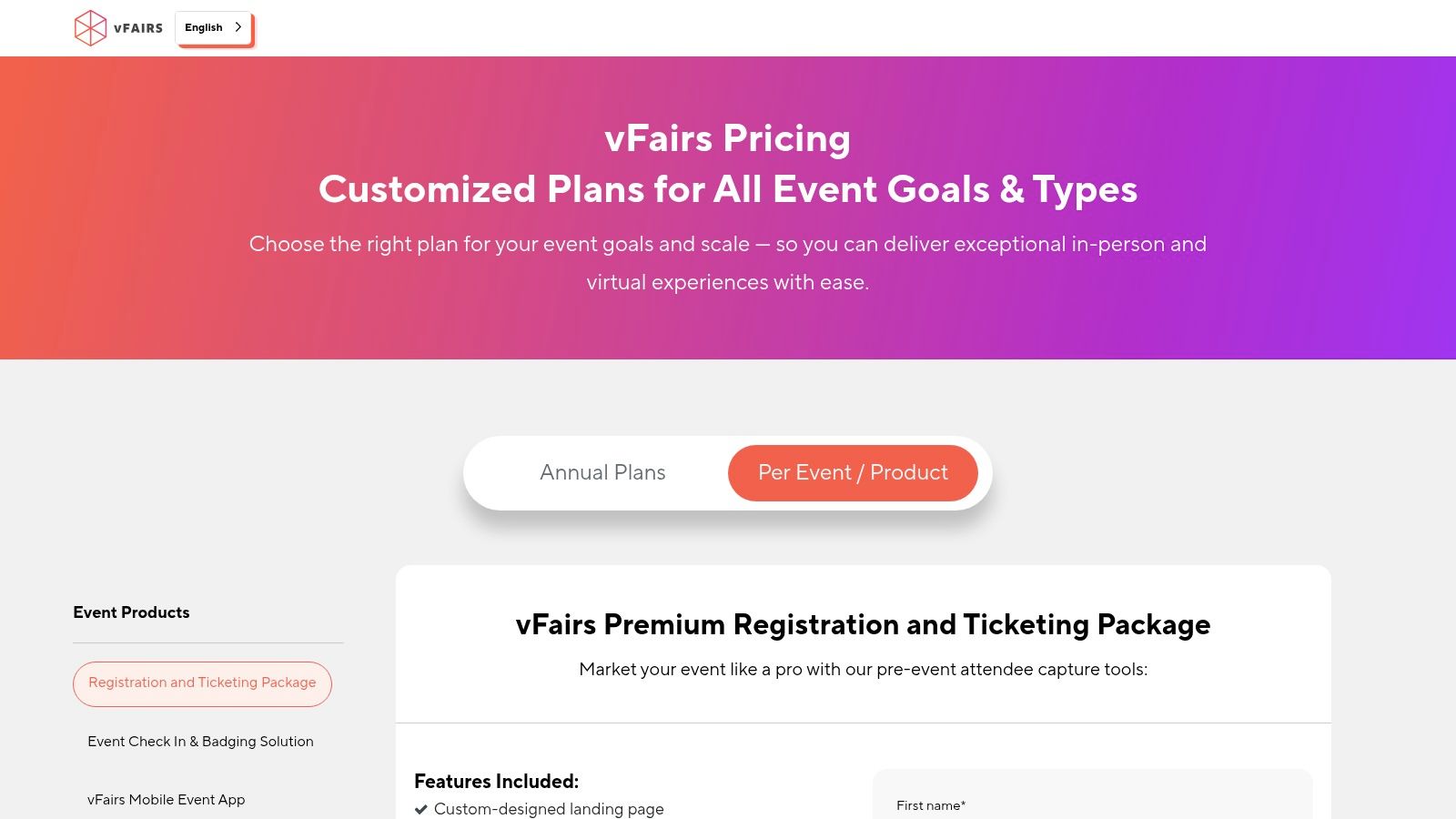
The platform’s strength lies in its ability to replicate the look and feel of a physical venue, complete with animated avatars, interactive exhibitor booths, and detailed virtual lobbies. This approach boosts engagement by providing a memorable and navigable space. vFairs is also highly regarded for its robust back-end features, including powerful analytics, lead capture tools for exhibitors, and broad payment gateway integrations.
vFairs operates on a custom pricing model, offering both per-event packages and annual licenses that often include unlimited events, which can be cost-effective for organizations with a busy event calendar.
Website: https://www.vfairs.com/pricing/
Bizzabo positions itself as an "Event Experience Operating System," offering a comprehensive and robust platform designed for managing an entire event portfolio. It excels at handling complex virtual, in-person, and hybrid events by integrating virtual production, advanced registration, a dedicated mobile app, and sophisticated analytics into a unified command center. This makes it one of the best virtual event platforms for organizations with a mature event strategy.
Its architecture is built for scale, making it ideal for large conferences and enterprise-level event programs that require deep data insights and seamless integration between live and digital audiences. Bizzabo's optional Klik SmartBadge wearables are a standout feature for hybrid events, enhancing in-person engagement through gamification and simplified lead capture, which directly feeds into the platform's central analytics dashboard.

Bizzabo’s core plans include unlimited events and registrations, which is a significant value proposition for high-frequency event producers. They also provide dedicated customer success managers and 24/7/365 support, reflecting their focus on the enterprise market.
To better understand what a comprehensive platform should offer, review these essential event management software features to see how Bizzabo compares.
Website: https://www.bizzabo.com/
BigMarker establishes itself as a highly customizable and browser-based virtual event platform, designed to create fully branded, media-rich online experiences. It excels at transforming a standard broadcast into an immersive virtual venue, complete with features like customizable lobbies, interactive expo halls, and AI-powered networking lounges. This focus on white-labeling allows organizations to maintain complete brand control throughout the attendee journey.
The platform is engineered for versatility, supporting everything from single-session webinars to complex, multi-day conferences with thousands of participants. Organizers can leverage media hubs to host on-demand content, extending the life of the event and providing lasting value. This capability makes BigMarker a strong contender for companies that view their events as a central part of a larger content marketing strategy.
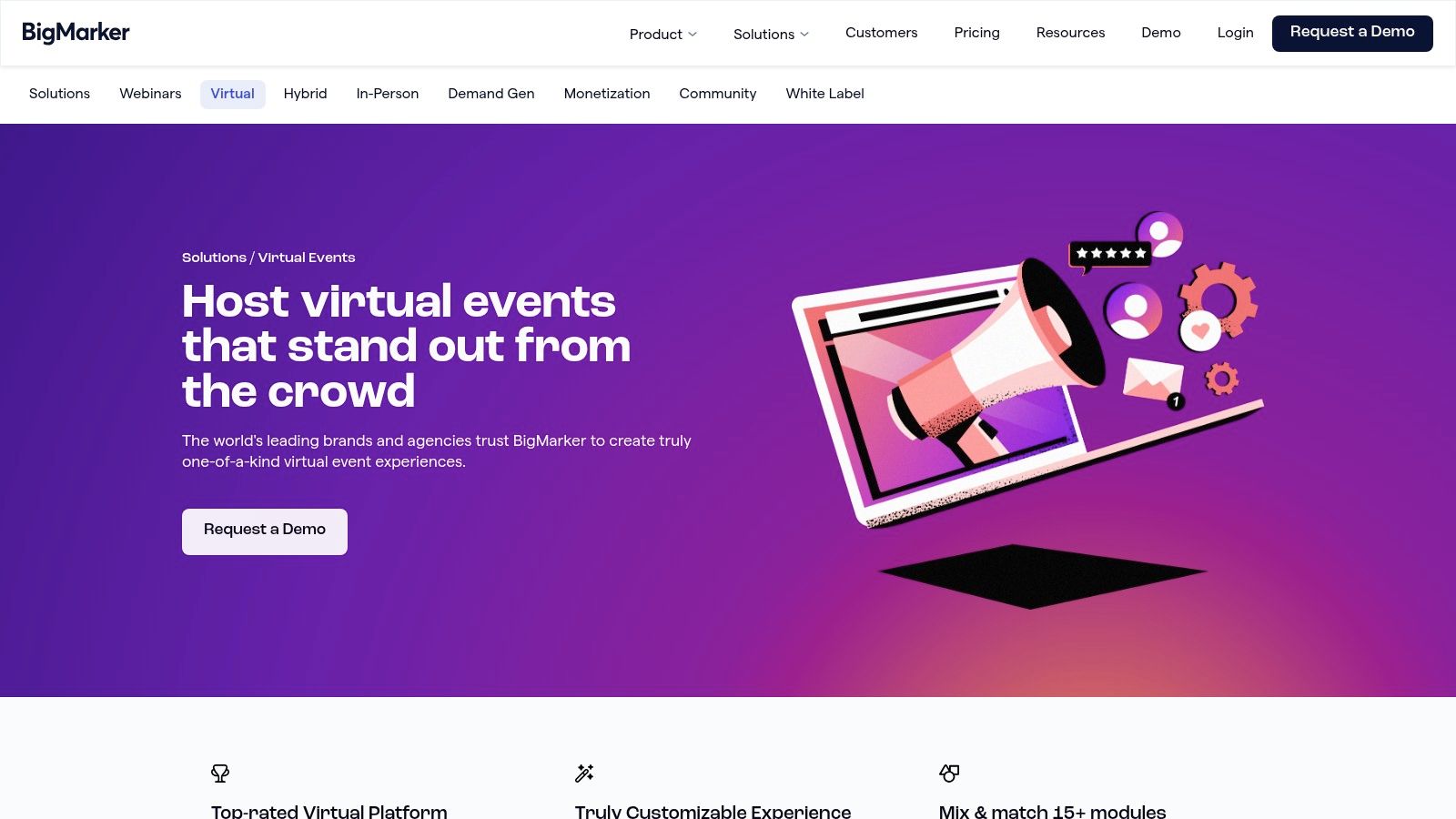
BigMarker’s licensing model offers single, multi-event, or unlimited packages, providing scalable options for different event calendars. Its native integrations for marketing automation and CRM platforms streamline the process of lead capture and follow-up, a critical function for sales-driven events.
Website: https://get.bigmarker.com/solutions/virtual-events
As a core component of Cvent's comprehensive event management ecosystem, the Attendee Hub is one of the best virtual event platforms for organizations looking to deliver enterprise-grade virtual and hybrid experiences. It’s designed to function as the central engagement point, combining live and on-demand video streaming with sophisticated networking tools and a virtual expo floor for sponsors.
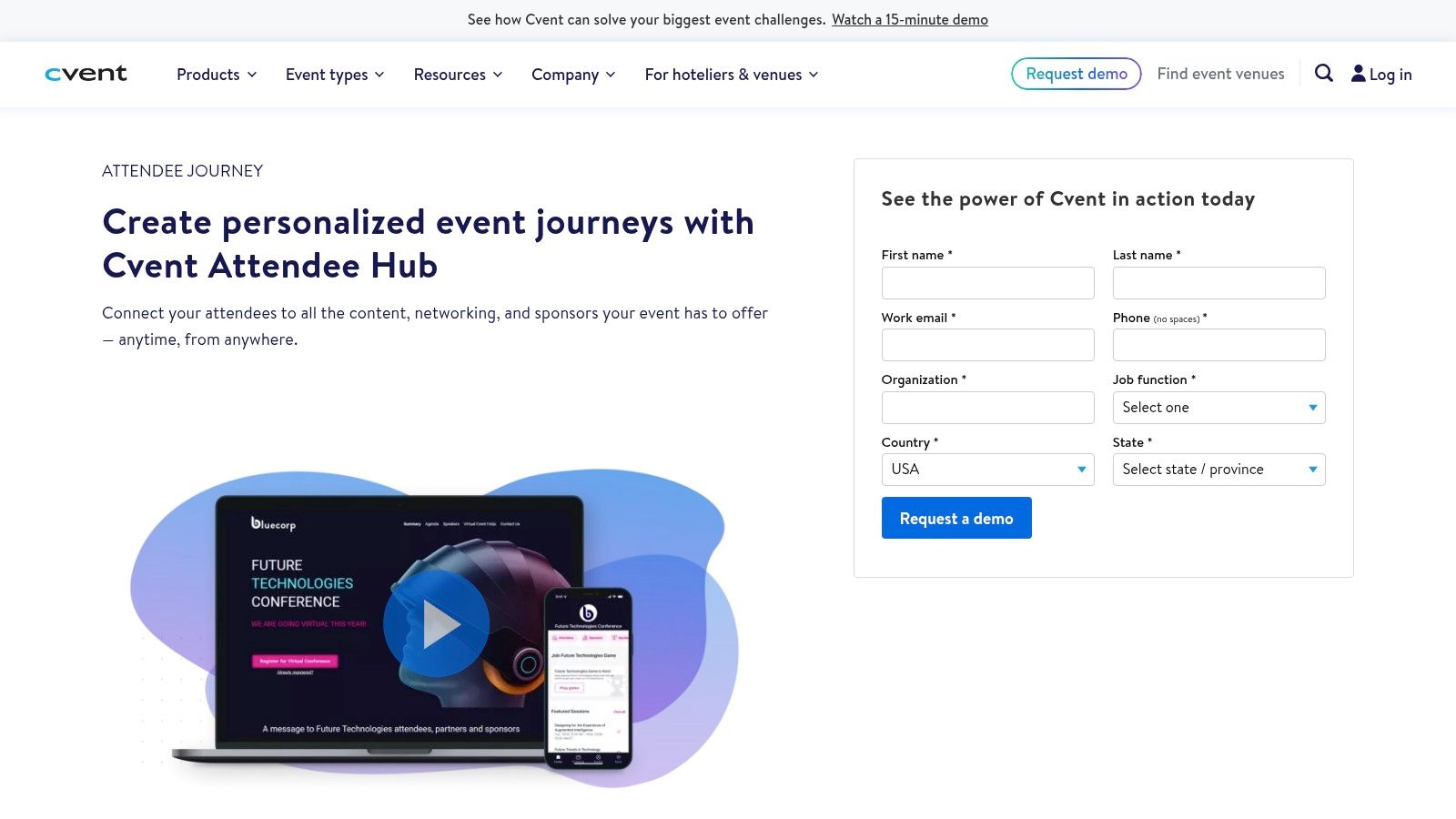
The platform’s strength lies in its deep integration with the broader Cvent suite for registration, marketing, and mobile apps. This creates a unified data flow, allowing for powerful analytics and personalized attendee journeys. For regulated industries or professional associations, its ability to manage and track continuing education credits and certifications is a significant differentiator.
Cvent Attendee Hub's pricing is quote-based, tailored to the specific needs and scale of each event. This approach is common for enterprise-level software, reflecting its customizable and feature-rich nature.
For those looking to understand the full scope of such platforms, you can explore the fundamentals of what event management software is and how it centralizes event operations.
Website: https://www.cvent.com/en/event-marketing-management/attendee-hub
Accelevents positions itself as a comprehensive, all-in-one event management solution built to handle virtual, hybrid, and in-person experiences with equal proficiency. The platform is notable for its transparent pricing model, which offers clear options for single events or annual subscriptions, making it accessible for both one-off conferences and organizations with a full calendar of events. It covers the entire event lifecycle from registration and ticketing to the virtual event hub, networking lounges, and even onsite features.
This balance of functionality makes Accelevents one of the best virtual event platforms for organizers seeking a single tool to manage a diverse event portfolio. Its user experience is streamlined, aiming to consolidate what would otherwise require multiple disparate software solutions into one unified dashboard. The platform's commitment to support is also a key differentiator, offering 24/7 live assistance with rapid response times.
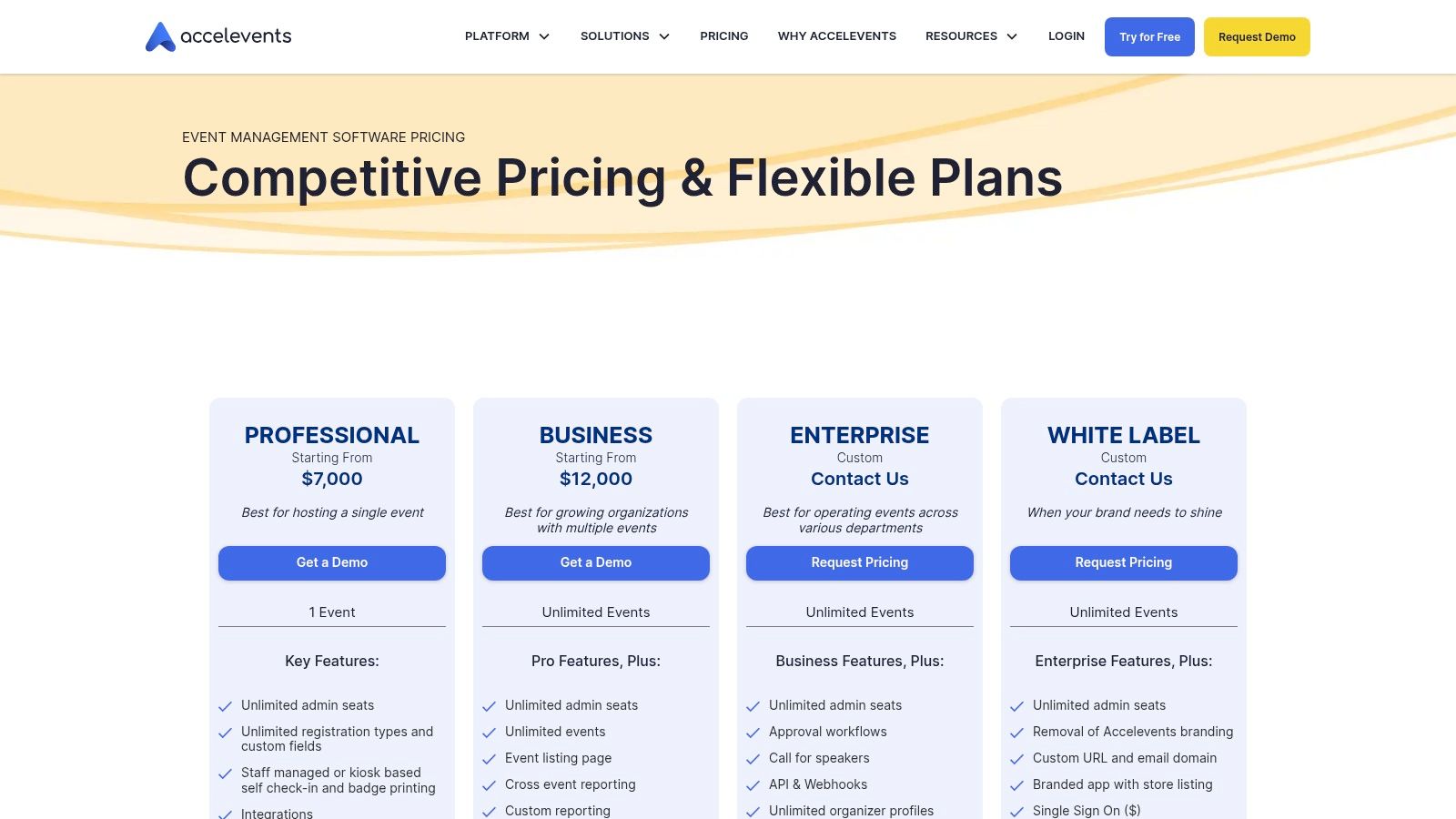
Accelevents provides a tiered structure with Professional, Business, and Enterprise plans, allowing users to select the feature set that matches their needs. Add-ons like a dedicated mobile app and badge printing are available to enhance the hybrid and in-person experience.
Website: https://www.accelevents.com/pricing
Remo distinguishes itself among the best virtual event platforms by focusing on creating authentic, human connections through its unique "virtual ballroom" interface. Instead of a linear broadcast, Remo places attendees in an interactive floor plan with virtual tables, allowing them to move freely and engage in small-group video conversations, much like at a physical networking event. This design is highly effective for fostering organic interactions.
This platform is specifically built for networking-heavy events such as job fairs, community meetups, and workshops where conversation is the main goal. Organizers can create branded, immersive floorplans that make the experience feel less like a webinar and more like a dynamic, engaging venue. The intuitive table-shuffling and real-time engagement features like polls and Q&A help maintain energy and participation.
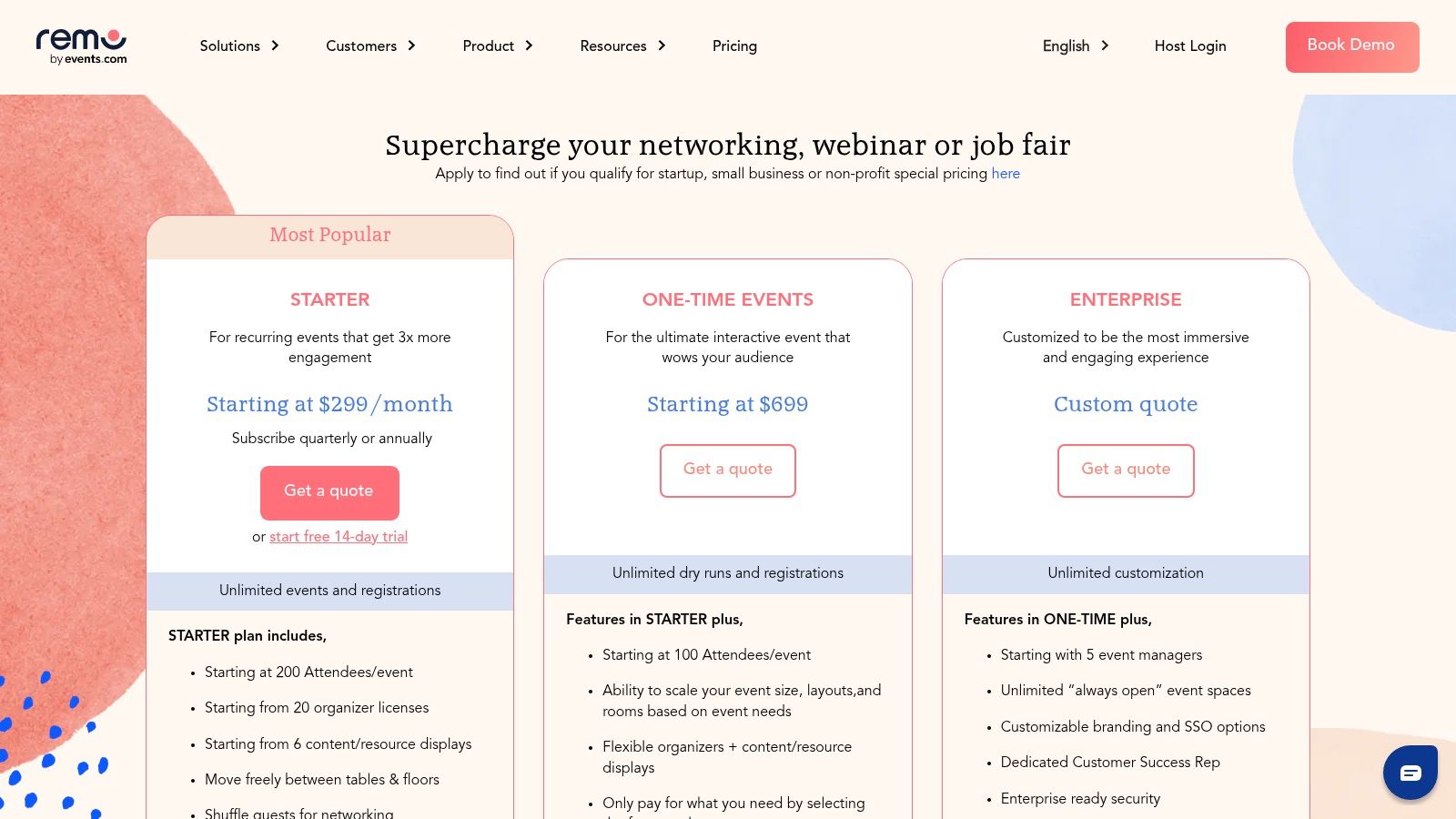
Remo’s pricing is transparent and accessible, offering both one-time event plans and recurring monthly subscriptions. With a 14-day free trial and straightforward credit-card checkout, it's particularly appealing for small to medium-sized businesses and startups that need a quick, powerful solution without complex enterprise contracts.
Website: https://remo.co/pricing
Navigating the expansive landscape of the best virtual event platforms can feel overwhelming. We've journeyed through twelve of the industry's top contenders, from comprehensive enterprise solutions like Cvent and Bizzabo to specialized tools like ON24 for webinars and vFairs for immersive virtual environments. Each platform brings a unique set of strengths to the table, tailored for different event sizes, formats, and strategic goals.
The core lesson is clear: the "best" platform is not a one-size-fits-all solution. It's the one that aligns most precisely with your organization's specific needs, your audience's expectations, and your long-term community engagement strategy. A simple, single-session webinar has vastly different requirements than a multi-day international conference with complex networking, exhibitor booths, and detailed analytics.
As you weigh your options, revisit these critical decision-making pillars. Your final choice should be a strategic investment, not just a logistical tool.
Feeling ready to make a decision? Don't rush. Follow this structured approach to ensure you select the right partner for your virtual event needs.
Ultimately, choosing from the best virtual event platforms is a strategic decision that impacts your brand, your audience engagement, and your bottom line. Take the time to conduct thorough due diligence. The right platform will not only help you execute a flawless event but will also become a cornerstone of your community-building and revenue-generation efforts for years to come.
Ready to move beyond one-off events and build a thriving, year-round community? GroupOS integrates powerful virtual event capabilities directly into a comprehensive community management platform, transforming attendee engagement into lasting member relationships. Discover how our unified approach can help you create more value and drive sustainable growth by visiting us at GroupOS.


